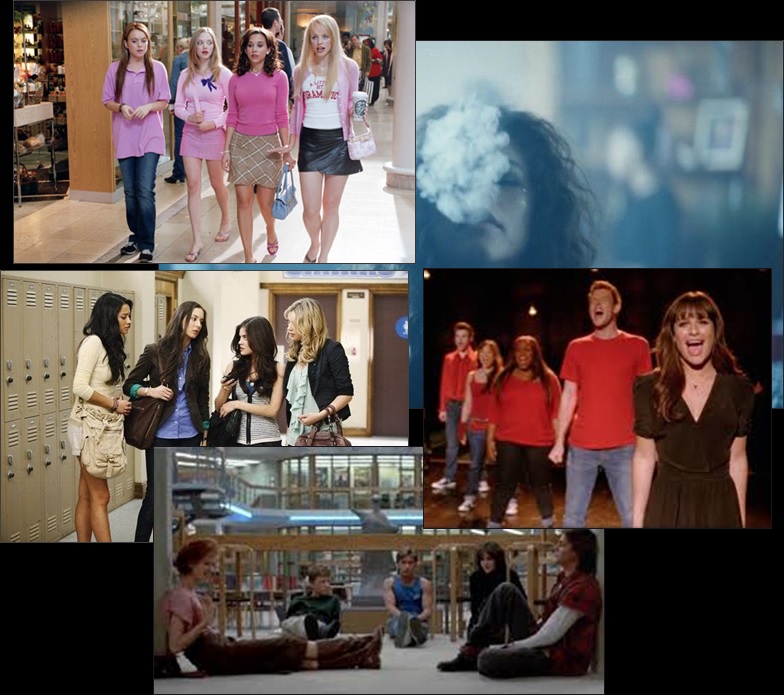Caroline Hinson

Wikipedia Sets the Stage
‘Codes and conventions of teen films vary depending on the cultural context of the film, but they can include proms, alcohol, illegal substances, high school, parties, virginity, social groups and cliques, fitting in, peer pressure, and popular culture.
The classic codes and conventions of teen film come from American films.
The average age of an actor playing an American teenager is 22.’[1]
It is convenient that most everyone on earth has been a teenager. It is even more convenient that these hybrid teenagers of Hollywood – polished, buffed, nipped, tucked – allow us to put
our best face forward. And legs. And tits. And teeth.
‘After all’, we say, laughing, canines white and sharp, ‘Isn’t America the rebellious teenager?’ We’re still figuring it out, as cool as James and Marlon without their cause, leaning against the Chevrolet, even though we’ve Had A Cause for some time, close to ten years now, but no one wants to be reminded of it
(but its unavoidable to remember when TV sets are rattled out into classrooms early mornings in September, or when you struggle to take your shoes off in the airport queue)
Convenient also how our teens are young enough to be desirable, but old enough to be emulated; young enough to be reckless; old enough to wholly own their agency
Convenient also how America is young enough to be desirable, but young enough to be reckless. How we are established enough to be emulated; but so, so understanding – we know how you feel because we are how you feel: here, look – we are trying our first cigarette, see the ash sift through our fingers; look at us inch towards our first love nervously on the bench; your voice rise as you fight with your mother. Isn’t this you? Of course it is.
Because this is also Us, this is America, the tremor of first love is just as powerful and beautiful as righteous revenge, the resolution of plot and how the Good …(which is good because it feels good because it feels big and if there’s any way to describe how you feel, it is big, it is unprecedented, it is morally righteous, it is an emotional battleground, it is war) …wins, it has to win
Don’t look anywhere else, don’t look back, don’t look too hard. Look at you. Look at our reckless youth. Look at us, all in this together.
Euphoria (2019)
Smoke trailing out of teen lips. Teen faces in highly saturated color tilted up towards the sky. Eyes rolled back in ecstasy.
Eyeshadow, dark and provocative as a bruise, shining with glitter, about to become the next hot trend on social media, the pigment smeared and dusky, smoldering; ‘I am broken’ it says, ‘there’s nothing you can do to hurt me….so hurt me more’
“follow a group of high school students through their experiences of sex, drugs, friendships, love, identity and trauma” the internet tells us of the show, but we of course we know this, we are well versed in this
[but what it fails to mention is that the show is a vehicle for infinite themes of emerging maturity; I once heard an aphorism that the media is on a quest to convince us that high school – that hallmark of Americana – is college; that every milestone of adulthood (sex, parties, identity) does not emerge when you have left home, no, it does and must happen in high school, where you are still just close enough for us to watch, we can still see you, film you, choreograph you, clothe you in glitter, see every flail of discomfort, the voyeuristic excitement of the friction between what you are and what you should be, what we want you to be
and, most importantly, how we want you to be seen.]
Seduction
I did not realize it at the time.
It was my first week at university, and I was sitting in the corner of the pub with two new friends, both French; I was tipsy, from the cider, and tipsy
Tipsy from the fact that I was sitting in this dark corner thousands of miles across a dark sea from my home, the air sweet with sweat and the idea of strangers; everything that was yet to be shared and people who were not known yet
Drinks flowed and the distance between us shrunk, we assumed the universal position of university students leaning towards each other over wooden tables, shoulders hunched, slightly yelling over the humming chatter of the patrons, swapping stories in order to share ourselves, preliminary efforts, like an archaeologist surveying the dirt
And I began telling them a story, the first story that I would tell at school…it was random, and it was about my high school football games…
The mist that hung over the nighttime field, how you would notice for the first time how deep and silent the forest was at the edges of the clearing, the slam of the car door as your parent dropped you off, the muffled echo of the announcer that seemed miles away even as you walked closer, the hundreds of people somehow in the stands, how you barely watched the game and wandered in groups instead like crop circles, the halftime band [best in the county, I said, with an ironic, knowing grin] and the baton twirlers and the feeling of your heart pounding in your ribcage as the percussion section marched by you, and how suddenly your classmates had transformed from that sterile banality of that morning and had become beautiful, were double outlined with the glow of pageantry, of this show we were performing for no one at all, except for ourselves –
[And except, of course, for the two French students that were leaning so close now – and the boy (who was an Arts student, whose sensitivity and honesty belonged to another time, a time where people wrote letters to each other) reached his hands out to grab mine – “That is so beautiful!”] and they began to ask me eager questions about “high school”, a sudden unreservedness, a slip from the language of dry, self-referential distaste with which we had all rightly agreed to treat America in our conversations
And all of a sudden I realized what I had been doing, and how the show that we performed for ourselves on that dark, dreamlike football field years ago was the doubled image of what we knew we were supposed to be doing; and the feeling of otherworldliness we felt we occupied was because all of a sudden we briefly played the part assigned to us since cable TV began playing in our living rooms
To participate in idolizing our own youth, The Youth, which therefore was everyone’s youth; children playing adults playing children
Naïve, self-perpetuating and powerful in its permanence. I never want to go home. But I’ll always remember the football games.
[Addendum: A Recent Conversation With My (English) Boyfriend of Three Years]
Our first date, what was it about our first date that caught your attention?
Ahhhh…Hmm. I think it was how you were so upset by that story I told you, the one about my friend who was detained at the airport, how you thought it was so unfair…
Oh – and that story you told me about the football games. The high school football games. That was cool.
Reflection:
These poems were written with a combination of brief data-driven or descriptive excerpts from online databases, dramatic recreation of personal experience and interpretation of these elements to connect to its broader global-political themes. The first poem discusses the commodification of ‘youth’ and its messaging – namely, recklessness, adventure and the excitement of exploration without consequence – which is linked back to similar messaging behind the War on Terror, and America’s political emphasis on emotionality and morality. The second poem explores how the glamorization and sexualization of the ‘high school’ trope influences not just its global presentation but how its impact upon the students who are experiencing it in real time, under the pressures of hyper-maturation that Hollywood pushes. The final poem continues to reflect upon this theme of ‘living out’ a stereotype in real time, and the ways in which personal experiences of high school can function, unknowingly, as propaganda. This was inspired through class readings which interrogated media (specifically American media tropes) as targeted and intentional messaging to a global audience, aided by a near-monopoly on the TV and film industry. This was combined with a recent discussion with an English friend (recorded in the notebook) about the presence of the American High School trope in their youth, which triggered my various memories and opinions surrounding this theme.
[1] Ben Lindbergh ‘Thirty Going on 12: The Adult Actos Who Play Movie Teens, by the Numbers’, The Ringer, Aug 2020 accessed at: https://www.theringer.com/movies/2020/8/28/21405196/adult-actors-playing-teen-analysis#:~:text=%E2%80%A2-,An%20error%20occurred.,in%20a%20qualifying%20teen%20movie.
Click Below to Return to the Curation Front Page:
![]()
Works Referenced/Images Used:
https://en.wikipedia.org/wiki/Teen_film
Ben Lindbergh ‘Thirty Going on 12: The Adult Actors Who Play Movie Teens, by the Numbers’, The Ringer, Aug 2020 accessed at: https://www.theringer.com/movies/2020/8/28/21405196/adult-actors-playing-teen-analysis#:~:text=%E2%80%A2- Ben Lindbergh ‘Thirty Going on 12: The Adult Actos Who Play Movie Teens, by the Numbers’, The Ringer, Aug 2020 accessed at: https://www.theringer.com/movies/2020/8/28/21405196/adult-actors-playing-teen-analysis#:~:text=%E2%80%A2-,An%20error%20occurred.,in%20a%20qualifying%20teen%20movie.
,An%20error%20occurred.,in%20a%20qualifying%20teen%20movie.
https://en.wikipedia.org/wiki/Euphoria_(American_TV_series)
https://www.buzzfeed.com/gyanyankovich/i-wanted-a-locker-so-bad
https://25yearslatersite.com/2019/06/19/hbos-euphoria-pilot-sex-drugs-and-escaping-pain/
https://www.criterion.com/current/posts/5243-the-breakfast-club-smells-like-teen-realness
